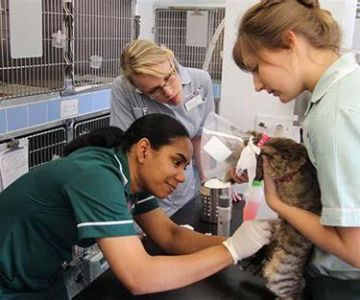- 1-Foundation-in-Science-Education
- 2-Veterinary-School-Admission-Requirements
- 3-Vet-School-Curriculum-and-Training
- 4-Internships-Residencies-and-Specializations
- 5-Real-World-Examples-of-Veterinary-Education-Paths
- 6-Resources-to-Start-Your-Education-Journey
1. Foundation in Science Education: The First Step Toward Becoming a Veterinarian
Understanding what are the educational requirements of a veterinarian starts with a solid foundation in science during high school and undergraduate studies. Subjects like biology, chemistry, physics, and mathematics are critical because they prepare students for the demanding curriculum of veterinary school. Many aspiring vets pursue a bachelor's degree in fields such as animal science, biology, or pre-veterinary studies, which help build essential knowledge and skills.
This stage is not only about academic performance but also about gaining practical experience through volunteering at animal shelters or clinics, which enhances an applicant’s veterinary school prospects. For instance, Alex Johnson, a successful veterinary student, credits his early exposure to animal care as a major factor that helped him meet rigorous vet school prerequisites.
2. Veterinary School Admission Requirements: What You Need to Know
Getting admitted into veterinary school is one of the most critical hurdles for anyone asking what are the educational requirements of a veterinarian. Admission committees look for strong academic records, high scores on entrance exams like the GRE, and relevant hands-on experience. Letters of recommendation and personal statements showcasing passion for animal welfare also play a significant role.
Each veterinary college may have specific prerequisites, but most require coursework in animal biology, organic chemistry, and physiology. Some schools also value extracurricular activities such as research projects or leadership roles in animal-related clubs, which demonstrate commitment beyond academics.
3. Veterinary School Curriculum and Training: Gaining In-Depth Knowledge and Skills
Once admitted, veterinary students undergo an intensive curriculum combining classroom theory and clinical practice. The curriculum typically spans four years, covering subjects like anatomy, pharmacology, pathology, surgery, and animal nutrition. Hands-on training in veterinary hospitals allows students to apply what they’ve learned on real cases under expert supervision.
During this time, students develop critical diagnostic and treatment skills, learning to work with a wide variety of species from household pets to farm animals. The practical experience gained here is essential for developing confidence and competence before graduation.
4. Internships, Residencies, and Specializations: Expanding Career Opportunities
After earning a Doctor of Veterinary Medicine (DVM) degree, many vets pursue internships or residencies to specialize in areas such as surgery, dermatology, or exotic animal care. These additional training periods can last from one to three years and offer deeper expertise as well as enhance career prospects.
For example, Dr. Michelle Rivera specialized in veterinary oncology after completing a residency, enabling her to treat complex cancer cases in pets. Such specialization often requires board certification, further validating the veterinarian’s advanced skills and knowledge.
5. Real-World Examples of Veterinary Education Paths: Learning From Experience
To bring clarity to what are the educational requirements of a veterinarian, real stories provide invaluable insight. Consider the journey of Tom Daniels, who initially studied biology but found his true passion in veterinary science during college. His commitment to rigorous coursework, internships, and networking led him to graduate top of his class and secure a sought-after residency.
Another inspiring example is Dr. Lisa Nguyen, who overcame challenges balancing part-time work and studies but ultimately excelled through persistence and support from mentors. Stories like these illustrate the dedication required and encourage future veterinarians to stay motivated despite obstacles.
6. Resources to Start Your Education Journey Toward Veterinary Medicine
For those wondering how to meet what are the educational requirements of a veterinarian, numerous resources can support the journey. Investing in comprehensive veterinary textbooks, exam prep courses, and online platforms offering animal science education can make a significant difference.
Moreover, specialized study guides and practice tests for entrance exams help applicants perform their best. Access to veterinary equipment kits or interactive learning tools can also enrich practical knowledge before and during veterinary school.
Explore trusted educational products and courses designed for aspiring veterinarians to ensure you’re well-prepared to meet the demands of veterinary education and advance confidently toward your career goals.










